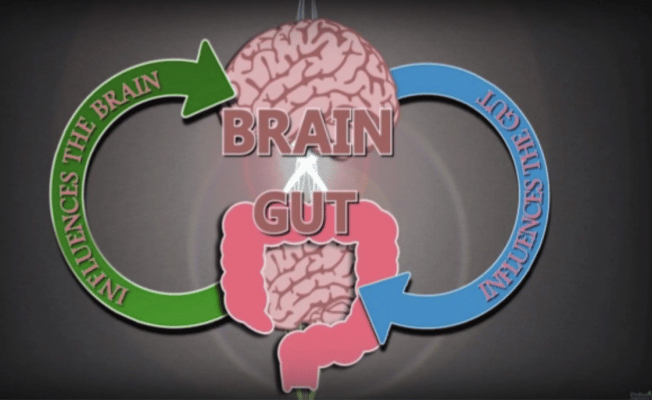Did you know that the gut is called ‘the second brain' by scientists studying the gut-brain connection?
There's constant messaging going on between the brain and the gut, so if the brain is stressed out, guess what? The gut is going to suffer. And if the gut's out of balance, then that passes on to the brain!
So we know that stress has a big impact on your hormones, and it's no surprise that stress can have a huge effect on your digestion, contributing to symptoms such as bloating, constipation, diarrhoea, gas, pain, reflux and more.
When your body senses danger (which used to be a lion attack, these days it's just modern life!), your stress response kicks in, and you produce adrenalin and cortisol to keep you alive. Digesting your food is not going to be top priority when your brain thinks you're facing imminent death! When you're under constant stress, your digestion can really suffer.
Cortisol and your Gut
Cortisol's job is to keep you alive by keeping your body on full alert. To do that though, it needs to divert energy from other systems in your body. The impact on the gut-brain connection includes;
- Eeducing your secretion of stomach acid and enzymes that help to digest your food
- Increasing inflammation which can lead to digestive issues, malabsorption of nutrients, leaky gut and further issues
- Weakening your immune system making you more prone to infections and inflammation
- Breaking down that muscle of your gut wall leading to leaky gut and potential autoimmune conditions
- Suppressing your thyroid, which supplies energy to your digestive system (this can cause the gut to slow down, leading to constipation and bloating)
What Kind of Stress?
It's not just being busy that is a source of stress for your body. There are lots of other stresses that can raise cortisol, but you may not be aware of them.
Dietary Stressors
- Processed foods – hydrogenated vegetable oils and food chemicals
- Sugar and refined carbs that can cause blood sugar imbalances
- Food sensitivities – including gluten or lactose intolerances
- Alcohol – can irritate the gut lining, stress the liver and deplete the body of nutrients
- Dehydration
- Not enough fibre
Emotional Stressors
- Anxiety, which can increase during perimenopause
- Trauma
- Relationships
- Self esteem, confidence
- Emotions; anger, sadness, loneliness, grief, lack of purpose
Lifestyle Stressors
- Busy-ness – are you running from one task to the next, unable to switch off?
- Bolting down your food mindlessly (popcorn anyone??)
- An addictive relationship with technology
- Lack of sleep
- Being too sedentary
- Over exercising
- Smoking
- Medications
Environmental stressors
- Pesticides used on non-organic fruit and veg
- Plastics – such as BPA, a known endocrine disruptor
- Phthalates found in synthetic fragrances
Physical Stressors
- Surgery
- Illness or infection
- Pregnancy and childbirth
And on top of all these stresses, you may be going through perimenopause or menopause which can be another huge stress on the body!
Natural Solutions
So what do we do about making sure our gut-brain connection is working well and sending positive messages?
-
Manage your stress
-
- Prioritize your sleep
- Meditate / deep breathing / mindfulness
- Slow down for meals – try mindful eating
- Chew more – try to chew until the food is liquid before swallowing
- Relax and have more fun! Make more time to do things that you love
- Get some therapy – there are lots of specialist practitioners that can support you with emotional issues (I love the Thrive programme)
- Assess your relationship with your phone/computer – try these simple tips
2. Eat a gut friendly diet
-
- Reduce sugar, refined carbs, processed foods to reduce any stress on your digestion
- Try eliminating gluten and/or dairy for a few weeks to see if they are a potential stressor for you
- Limit alcohol
- Eat diverse and colourful veggies every day – fill half your plate (here's our Happy Hormones Plate for guidance)
- Probiotic foods – including live natural yoghurt, sauerkraut, kefir, kombucha, kimchi
- Prebiotic foods – including onions, leeks, garlic, cold potatoes, green bananas
- Good fats – including olive oil, coconut oil, avocado, nuts, seeds, oily fish – avoid vegetable oils
- Try Apple Cider Vinegar and/or digestive enzymes to aid digestion
- Hydration – drink 2L of fluids per day
3. Minimise toxins
-
- Eat organic where possible to avoid pesticides
- Reduce plastic – switch to glass or stainless steel water bottles and food containers (whatever you do, don't heat plastic in the oven or microwave)
- Switch to natural products – including cleaning, laundry and personal products to avoid synthetic fragrances (try www.biggreensmile.com for alternatives)
4. Natural activity
-
- Take regular breaks from sitting – set an alarm to get up and move, walk or get some water
- Walk more, especially in nature – this helps reduce stress and boost your mood
- Don't over-exercise if it depletes your energy – this is a sign that your energy reserves are low and you need to prioritise them
- Try yoga and pilates for reducing stress – also great for strength, flexibility, mood and bone health!
Now, if you do all of this and still have symptoms, you may need to dig a bit deeper to see if there's an underlying infection or imbalance, which you won't know about unless you do a stool test.
We use stool tests that I believe are the best in the world! They look for the DNA of microbes so that you only need a tiny sample to know what's going on in your gut. Once we have found the root cause of your gut issues or IBS, we can start to rebalance everything and get you back to normal.
Please don't suffer in silence. Contact us if you'd like more information.

